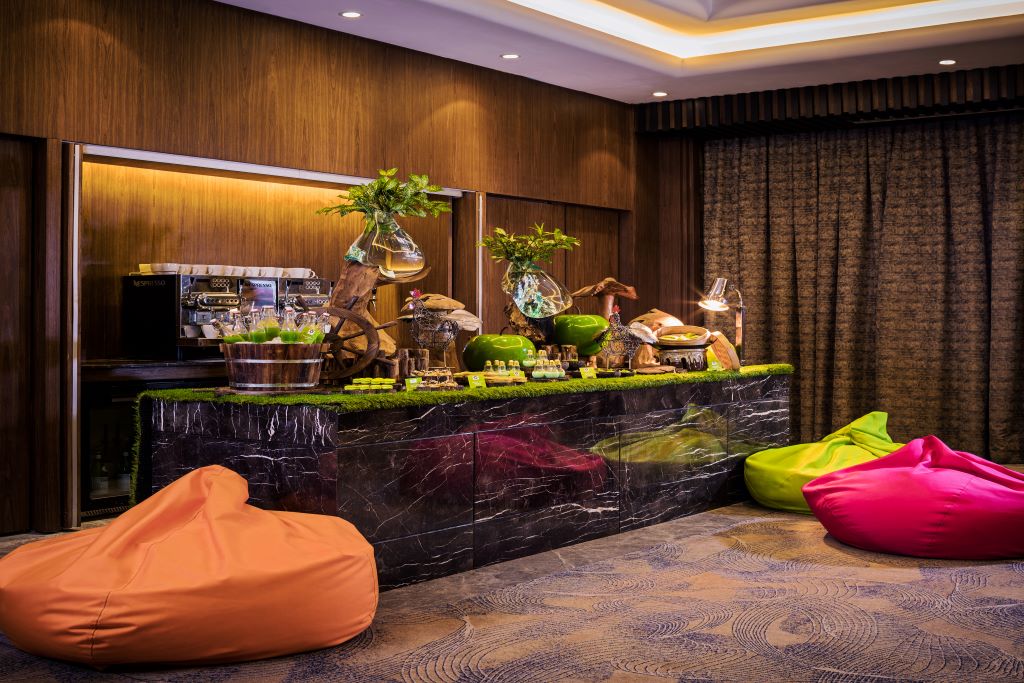Skift Take
It only makes sense that business travel — including meetings and conventions — would incorporate more aspects of the wellness movement. While industrywide changes are happening, it’s debatable whether they’ve made a real impact on the lives of business travelers yet.
Oh, the joys of business travel — drinks with coworkers who you may not particularly care for, early morning presentations (hopefully not hungover), red-eye flights, and, lest we forget, long layovers and flight delays.
Some of those aspects of business travel are unavoidable — mainly the flight delays — but the business travel and meetings industry is hoping to give the other situations a wellness makeover.
“The business travel industry is taking baby steps to incorporate more wellness, but there is a ton of room left for growth,” said Sahara Rose De Vore, founder of the Travel Coach Network, a community of travel coaches.
Why go through the trouble of a wellness refresh? It’s what people increasingly want. The times are changing with business travel — rather than powering through a work trip on little sleep and pressing pause on healthy habits, business travelers now want to keep up their wellness routines while away.
To do so, business travelers are making booking decisions that match their new wellness wants. In fact, 83 percent of business travelers look at fitness options when choosing a hotel, according to a 2019 CWT survey.
The daily Routine
Hotels, for example, are all too happy to help business travelers keep up their fitness routines. Many, like those in Marriott’s Westin chain, have equipped their gyms with Peloton bikes along with the streaming service. You can even use a search tool to see what hotels offer the bikes. It’s a smart call, considering the popularity of Peloton and how simple it is for hotels to invest in a few bikes.
The food that business travelers eat is also ready for a refresh. Beyond just lack of sleep and the stress of travel, the CWT survey found that unhealthy eating was the third biggest wellness concern (at 33 percent of respondents). At the same time, 73 percent of business travelers want hotels to offer healthy food delivery. Hotels would be wise to take note and start coming up with nutritious, quick options.
One company, BizEatz, is trying to beat hotels to the wellness punch. The app helps business travelers find healthy eateries nearby, then arranges those healthy meals to await business travelers at check-in. It’s a simple concept that hotels may even start to poach.
Strategic Travel Booking
And it’s not just the food and exercise sectors — business travel booking is also getting a wellness revamp. Take Fairfly, which just announced the new Fairfly Wellness, a dashboard that gives a well-being score to flight itineraries, based on factors like length of layovers, frequency of flight delays or cancellations, and whether it includes a red-eye. You know, all the things that make flying miserable.
So when travel and human resources managers book flights for employees, they can take those wellness factors into account, in addition to price. Why bother? Well, after two layovers and a delay, it’s pretty difficult to give a dynamic PowerPoint presentation.
“Anything can go wrong on a trip and negatively impact a traveler’s overall well-being,” says Rose. “So you’re seeing companies trying to minimize those events and their negative impacts to improve the overall travel experience while trying to prevent road warrior burnout and health issues.”
Meetings and conventions, too, have seen wellness become a more important factor in the planning process. “We have only seen the desire for the incorporation of wellness within meetings and events grow,” said Toni Zoblotsky, director of B2B marketing and sales valet at Hilton.
Hilton’s Wellness Offerings
Hilton launched its Meet with Purpose program back in 2015, and it’s now in 500 hotels. The program looks to help employees eat healthy food while at the meeting, keep the event sustainable with, for example, paperless registration, as well as include fitness and stress-relief activities at the events.
“We introduced the program in an effort to help meeting planners address the growing desire for wellness in the meetings and events space,” said Zoblotsky.
The hotel chain even launched something called Citrus Lift, which “features a menu of orange-infused foods, giving attendees the boost they need thanks to these Vitamin C-powered snacks,” said Zoblotsky. While it may sound a bit gimmicky, encouraging people to eat more oranges isn’t necessarily a bad thing.
At the end of the day, a shift to more wellness offerings is happening in the business travel space — even if it may not be as fast as other travel sectors. “The business meetings and conventions industry has started to dip its toes into traveler wellness but has yet to go to the depth necessary to really make a difference,” said Rose.
Maybe they should have a meeting about that to, you know, decide how to pick up the pace.
Have a confidential tip for Skift? Get in touch
Tags: business travel, corporate travel, hilton, meetings, Skift Wellness, wellness
Photo credit: Hilton Singapore introduced wellness options for meetings and events. Hilton
